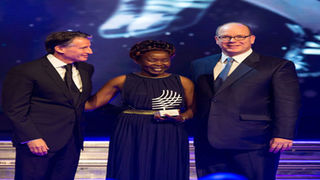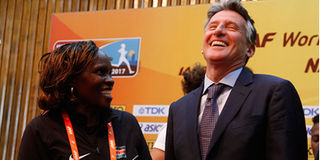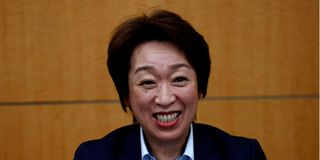
Tecla Lorupe with Wolrd Athletics President Seb Coe (left) and Prince Albert II after receiving her award in Monaco on December 2, 2016.
| File | AFPAthletics
Premium
Seb Coe rallies women to take up leadership positions in sport, fights for gender parity
What you need to know:
- Last week, the Tokyo Olympic Games Organising Committee announced it would add 12 new female directors to its executive board, effectively raising the percentage of women in Games leadership to 42 percent.
- This followed the resignation of controversial committee President and former Japanese Prime Minister Yoshiro Mori who was criticised for making sexist remarks.
World Athletics President Seb Coe is confident the global track and field governing body is on course to achieving gender parity in its leadership by 2027.
As the world celebrates the International Women’s Day on Monday, Coe says constitutional reforms introduced by World Athletics in 2016 to elevate women to positions of leadership are firmly on track and that by 2027, there will be 50-50 representation by men and women on the World Athletics Council.
According to the World Athletics gender equality roadmap, it was declared that at the world track and field organisation’s 2019 elections, “there must be a minimum of seven men and women elected from among the total of 26 Council members (including the one Vice President and one female and one male athlete representative).”
There are currently eight women on the World Athletics Council, making up 30 percent of its membership.
Further, it was agreed that: “At the 2023 Election, there must be a minimum of 10 men and women elected from among the total of 26 Council members (including the one Vice President and one female and one male athlete representative, thus making up 40 percent of the membership.
“At the 2027 Election, there must be 13 men and women on Council (including the two male and two female Vice Presidents, that is 50 percent of the membership.”
World Athletics is also seeking to “ensure gender parity on panels for technical officials and across staff at World Athletics HQ, review pathways for women coaches and will work with the Gender Leadership Taskforce on ensuring our Area Associations play their part in growing leadership opportunities for women in their regions,” a statement from Monaco on Sunday assured.
In a separate interview, Coe paid tribute to Kenyan women athletes for their performances and singled out the work being done by former world marathon record holder Tegla Loroupe in nurturing athletics talent among the refugee communities in Kenya.

World Athletics president Sebastian Coe (right) shares a light moment with Rose Tata Muya at the media conference at Kasarani stadium on July 11, 2017.
The athletics supremo also congratulated Tokyo’s Olympic Games organisers for increasing the number of women officials in the Games’ local organising committee.
Speaking exclusively to Nation Sport from Torun, Poland, on the sidelines of the European Indoor Athletics Championships, the British athletics legend said the World Athletics Congress of 2019 in Doha firmly set the stage for the elevation of women administrators.
“Even before I became President, I spoke about the need to improve our governance reforms to improve our governance standards and a large part of that was making World Athletics, particularly in our administrative areas, look diverse and inclusive,” he said.
“One element of those reforms was to provide a roadmap from 2019 through to 2023 and then to 2027 – each one is our voting congress – so that we have more women in the Council.
“We did that not by just saying that constitutionally that must happen, but we put in place some other mechanisms like the Gender Leadership Task Force and we organised global seminars which were about training the trainers.
“The whole purpose was to create pathways and programmes for women to be more confident about standing for these positions, for them to also be in a system where federations recognise that it’s really important that women have equal status in organisations as the men do.”
At the 52nd Congress of World Athletics (then IAAF) in Doha in 2019, for the first time, the world athletics body elected a female Vice-President, Ximena Restrepo, Colombia’s 1992 Olympic 400 metres bronze medallist.
Uganda’s Beatrice Ayikoru was also voted in as Council Member by the 203 delegates.
“We expanded the number of women in our Council to 30 percent. The process will mean that by 2023 that will be 40-plus percent and by 2027 it will be 50 percent.”

World Athlete of the Year Mutaz Barshim (right) with former high jump world champion Blanca Vlasic and World Athletics President Seb Coe at past World Athlete of the Year Awards fucntion at the Grimaldi Forum in Monaco.
Coe, a double Olympic gold medallist in the 1,500 metres, said beyond governance, World Athletics had fought for equal prize money for women and men in their competitions.
“If you look at our sport in the field of play, it is equal. Men and women can compete at pretty much the same disciplines; we have equal prize money. When it comes to pay, when it comes to platforms, when it comes to all the elements that make up our sport, it’s really important that we are really clear that we have to do better.”
The World Athletics President said his organisation has made key pledges as the world celebrates International Women’s Day.
“They are all about empowering and growing our sport, and empowering women within our sport to play a more central role.”
Tradition
He said the World Athletics’ headquarters in Monaco had embraced gender parity giving more opportunities for growth than before to women.
“At World Athletics, 51 percent of our workforce at every level is female, and 40 percent of that female component are in managerial positions.”
Coe said World Athletics’ pledges for equality include giving confidence to women and avoiding “unconscious bias” in the organisation.
Another element is to break with tradition.
“For instance, on the last day of our World Championships in Eugene next year, the last event on the track will be the women’s 4x400 metres relay final, rather than just finishing with the men’s final.
“These are really important elements that we wish to bring to life and give substance to. It’s not only about March 8, because there’s a lot that’s been going on in the organisation that makes it a different landscape than it was,” he said.
“I hope that in 10 or 15 years’ time or even sooner, it doesn’t need men to stand up and defend the right of women to be playing a role in our sport.”

Athletics Kenya President Jack Tuwei (left) and chief executive Susan Kamau (next to him) congratulate Wolrd Athletics President Seb Coe after the body passed massive reforms during a past congress in Monaco. Coe gave Tuwei the gold medal belatedly awarded to Milcah Chemos for the 2009 World Championships.
Coe is happy that there’s an improvement in the role of women in World Athletics’ continental affiliates.
“In Europe, the 2019 Congress in Prague had the first female Senior Vice President and four or five other women joined the Executive Council.
“Everywhere I look, there’s an improvement. And its not only because it’s constitutional, but because people realise it’s a serious part of our strategy. We cannot grow the sport unless we are inclusive and diverse.”
The World Athletics President stressed the fact that diverse organisations often returned positive performances.
“It doesn’t really matter whether you are in sport, politics or business, or creative industries, diverse organisations outperform organisations that are not diverse by 15 percent.
“If we talk about marginal gains in the performance of organisations, then 50 percent is a very large gain, if you get it right.”
Coe said while the fight for gender parity stays alive, women must also prove that they deserve elevation to positions of authority.
“It’s important that we provide the platforms and the toolkits and the online opportunities that we will be having for women to feel confident, and to feel that they have permission with the full support of the sport to play an equal role in the sport.
“We want our female athletes to feel that there is a future for them in the sport, as federation members, as board members, technical officials, coaches…
“We also want to be really clear to them that we want them to have a voice that’s amplified, but we also need to make sure we do everything we possibly can to protect them from online abuse because that’s something that’s unacceptable and that has grown in the last few years.
“We’d like to make sure women voice their opinions online and are not abused for doing so.”
Last week, the Tokyo Olympic Games Organising Committee announced it would add 12 new female directors to its executive board, effectively raising the percentage of women in Games leadership to 42 percent.
This followed the resignation of controversial committee President and former Japanese Prime Minister Yoshiro Mori who was criticised for making sexist remarks.
Coe, himself President of the successful London 2012 Olympic Games Organising Committee, sees the move by the new Tokyo Games President Seiko Hashimoto, a woman, as a step in the right direction.

President of the Tokyo 2020 Olympics Organising Committee Seiko Hashimoto smiles before the start of opening remarks session of the press briefing on operation and media coverage of Tokyo 2020 Olympic Torch Relay in Tokyo on February 25, 2021.
“I’m very pleased that women have been appointed to the (Tokyo) organising committee,” he said.
“In London, I was very proud to be President of an organising committee that had as many women in senior positions at director level as men, and certainly an organisation that had 51 percent of the workforce as women. This is really important.
“We are trying to encourage young people to look at the sport as an example of good practice – a sport that is not discriminatory, a sport that’s diverse.
“It’s really important that when they are looking at our sport, they are not only looking at the field of play, but they are looking at our government structures and making a judgement if it reflects the world they live in… and if it doesn’t, then we miss out on good talents because, my instinct is, they would not like to join organisations that are not reflecting the values and things in their own life that are absolutely instinctive and run-of-the-mill.
“That’s why it’s really important that athletics, the number one sport in the Olympics, should lead from the front on this.”
He said the move by the Tokyo organisers to add the number of women in the Games’ organising committee would make it “stronger.”
On the technical part of the sport, Coe noted that efforts have been made to encourage women to take up coaching and officiating roles.
“It’s not as good as it should be, and this is going to be one of our focus areas.
“There are two focuses we have, one is to make sure that for our technical officials, the skills are recruited at continental level. That will mean putting in programmes and initiatives that can be effectively delivered online.
“It’s also important that we continue to focus that we get more women as technical officials that reflect the global universal nature of the sport.
“We are in 2014 countries… We can’t just have technical officials from a handful of pockets of expertise. We need to help train those people that want to come into our sport.
“To have our global competitions as successful shop windows, we need very good technical officials, and it's a reality that our technical officials tend to come from an older demographic.
“We need to encourage young people to think that to become a technical official is an important journey in the sport.”
Coe expressed his pleasure on the role Kenyan women athletes have made in promoting the sport of track and field.
“What I’m really pleased about in the history of Kenyan athletics, is that the women’s performances – particularly in the last decade or so – have been as equally star-studded and illustrious as the men,” he observed.
“I’m delighted that as much effort and resource is applied to the development of athletics for women in Kenya through the federation and government support as there is for men.
“I’m really looking forward to being in Nairobi for the World Under-20 Championships in August because I know that on that occasion we will see some very young and talented Kenyan female athletes coming through, that in a year or two’s time will be distinguishing themselves on the world stage in senior athletics.
“My message is: Continue to do what you are doing to encourage women into the sport in Kenya and to maintain that big history that the predecessors have created.
“As a young athlete coming into the sport and as a young person, I was inspired as much by female athletes who were competing at the time as I was by male athletes.”
Coe was full of praise for Loroupe who has been working tirelessly to train refugee athletes who have since featured at the World Athletics Championships and Olympic Games as independent competitors.
“If you want a prime example of female contribution globally in the sport, not just on the track – because she was a fantastic champion – if you look at the work that Tegla Loroupe has continued to do around the refugee teams and refugee athletes, the contribution is enormous.
“That’s very much as inspirational as what she achieved on the track.”
On the eve of Monday’s International Women’s Day, World Athletics launched its #WeGrowAthletics campaign that “pledges to review age-old traditions around the presentation of women’s performances and achievements to emphasise the importance of women’s competition.”
As part of the campaign, World Athletics will:
• review World Athletics Series event timetables to put greater focus on highlighting women’s disciplines. This will be reflected in the timetable for the World Athletics Championships Oregon22;
• announce the winner of the Female World Athlete of the Year at the end of the 2021 World Athletics Awards and review the order for future shows.
• switch all stats and rankings lists on worldathletics.org to default to women’s disciplines;
“World Athletics pledges to put greater emphasis on how and by whom women’s stories are told on its platforms together with making them a safer space for everyone,” the statement from Monaco added.
This will include a move to:
• increase content created by women on World Athletics platforms, starting with World Athletics Women’s Week (8-14 March) where every piece of feature content on World Athletics platforms will be produced by and have involved women.
• create a clear anti-harassment policy for its channels to combat online abuse including but not limited to hate speech, bullying, sexism, racism and other misconduct.
• work with stakeholders, such as LOCs to tie event venues and courses to more women-specific stories.
“Additionally, World Athletics Productions will further reinforce World Athletics’ commitment to providing more platforms for women’s voices and pledges to implement a 50:50 gender split among both producers and directors as well as commentators and reporters on their team during the World Athletics Championships Oregon22,” the statement added.
Reported with additional resources from World Athletics





